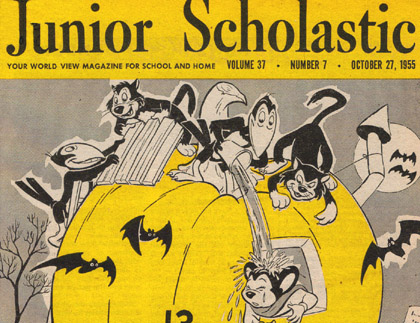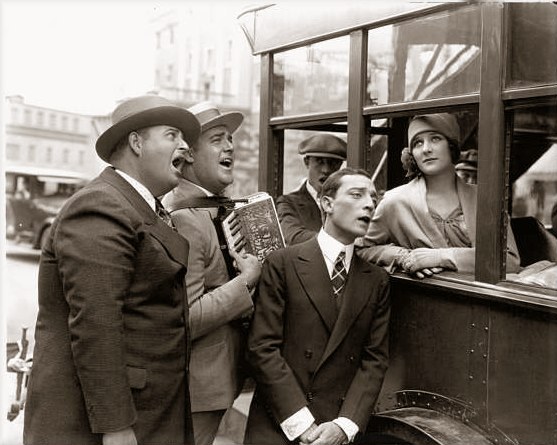From Junior Scholastic, Vol. 40, No. 15 (May 17, 1957). This poem won first prize in their writing awards, poetry division. My bio in that issue: “JONATHON [sic] ROSENBAUM says his poem grew out of a speech he wrote for his Bar Mitzvah. This is a ceremony at which Jewish boys of 13 enter into the full duties of their religion. He is 14 and attends Florence (Ala.) Junior High. He became interesting in writing at first through drawing comic strips. Now he writes both stories and poems, and his ambition is to become an author.”
As I recall, this poem was submitted to the Junior Scholastic Writing Awards via my home room teacher, who tried changing the last line to, “So begins eternity,” until I protested and got her to change it back.-– J.R.

The Aged One
Along a dark and dusty road
The mighty one does stride, His eyes as endless as the stars,
With no one by his side.
He walks through bright and friendly towns,
He goes through slums and slime…
He goes through all that is or was,
An aged one called Time.
He goes not right, nor left, but straight;
His face a frosty stare –-
Emotionless, and yet he leaves
A feeling in the air. Read more
From Sight and Sound, Spring 1971. This letter, which preceded my first article for the magazine by a little over a year, was mainly prompted by my having attended a public screening of a Keaton feature in London with a ruinous piano accompaniment. –- J.R.

SIR, — John Gillett’s comments about Spite Marriage in the Winter 1970/71 SIGHT AND SOUND gainsome relevance if one refers to Rudi Blesh’s Keaton (Secker & Warburg, 1966), where one learns that Keaton had tried to convince Irving Thalberg to make Spite Marriage with sound. ‘It needn’t be one long yak-yak,’ Keaton is reported to have said to Thalberg. ‘There’s nothing wrong with sound that a little silence won’t cure….I visualise sound effects. When you fall down and go boom, you really go boom. But leave the wisecracks and the bad puns and the dirty jokes to the burlesque comedians…. Let the man say, “Now you go and do this,” and then we go about our silent business with sound all around us.’
Immediately relevant to this information is the fact that Spite Marriage is one of the ‘noisiest’ of all silent films in its various visual strategies for suggesting sound, a quality that is only enhanced by its showing in Paris without musical accompaniment. Read more
This intemperate outburst — possibly written at some point during my stint at the University of California, Santa Barbara in the mid-80s, but far more likely written closer to the book’s publication date (1979), perhaps when I was still living in San Diego — was wisely and tactfully rejected by Chick (Ernest) Callenbach when I submitted it to Film Quarterly. (He added, as I recall, by way of explanation, that Film Quarterly tended to be a “friendly” publication.) Had I written it while I was at Santa Barbara, it would have probably been motivated in part by the fact that the late Frank McConnell (1942-1999) was far and away the most popular English professor at the university. But I’m pretty sure that my objections to his book were textual and ideological rather than personal — even if I later grumpily reflected that his popularity at UCSB was partly predicated on his uncanny capacity to both validate and extravagantly flatter not only whatever was most popular at the time, but also (it seemed) whatever his students said during his lectures, no matter how ill-informed or inane. Read more


